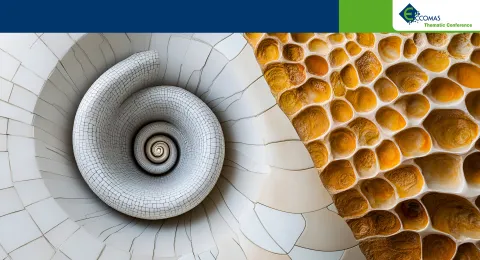We invite researchers and technologists to organize a Mini-Symposium (MS) or a Special Technical Session (STS) at EUROGEN 2025. Organizers are encouraged to propose a session theme along with a group of suggested speakers or presentations.
In line with past editions of EUROGEN, we also welcome additional submissions aligned with published MS or STS topics.
In addition, authors are invited to submit abstracts through the open call, independent of any MS or STS. These will be reviewed and grouped into thematic sessions coordinated by the conference organizers.
A Mini-Symposium (MS) or a Special Technology Session (STS) covers one or several of the conference topics (see list below). An MS addresses novel methods and tools with a more upstream, research-oriented focus, while an STS focuses on innovative technologies with industrial and societal applications. Organizers of an MS or STS will select the contributing papers for their session.
We encourage submissions that explore innovative methods for optimizing design and control using evolutionary algorithms, multi-objective optimization, and other advanced strategies.
The conference aims to address challenges in maximizing efficiency and effectiveness in engineering systems through advanced modeling and optimization strategies.
Important dates
Abstracts for Single Papers due: March 31, 2025 NEW DATE: May 16, 2025
Notification of Acceptance of Single Papers: April 7, 2025 NEW DATE: May 30
Full Paper Submission: October 31, 2025
Conference topics
Major Application Areas
- Aeronautical Aerospace and Space Engineering
- Automotive Engineering
- Bioengineering and Biomedical Sciences
- CAD and Manufacturing
- Civil and Structural Engineering
- Economics and Finance
- Electromagnetics and Electronics
- Energy, Environment and Climate
- Logistics
- Maritime Engineering
- Material Science and Technology
- Multiscale optimization in Micro-and-Nano-Mechanics
- Offshore, Coastal and Marine Engineering and Operations
- RAMS and Risk Analysis
- Telecommunications
- Turbomachinery
- Smart & Composite Materials and Structures
- Urban Mobility
Algorithmic Topics
- Adjoint based and One-shot Methods
- Artificial Intelligence, Surrogates-Metamodels and Fuzzy Systems
- Cloud computing, GPGPU computing environment
- Design Optimization under Uncertainties
- Game Strategies
- Goal oriented optimization for mesh and meshless methods
- Hybrid Methods, Metaheuristics and Evolutionary Algorithms, Machine Learning
- Life-cycle design optimization and structural health monitoring
- Linear, nonlinear, stochastic, parametric, discrete and dynamic programming & modeling
- Mathematical programming, constraint programming
- Multi-criteria decision Making
- Multidisciplinary, Multiphysics and Multi-objectives and Multi-criteria Optimization Methods
- Optimization in Micro- and Nano-Mechanics
- Parallel and Distributed Computing in Optimization
- Robust Design & Reliability Based Design Optimization
- Shape and Topology Optimization
Abstract submission - MS and STS
Submission Guidelines:
• Provide a brief description of your proposed MS/STS, including the title.
• Include the names of four recommended speakers, one of whom may be designated as a keynote speaker.
• Sessions will be two hours in duration.
• Use the submission template to format your proposal.
Accepted abstracts will be published in the Abstract Book on the conference website. Additionally, full papers are welcome and will be published as a hard copy by Springer after the conference (optional). The deadline for full paper submissions is scheduled for after the conference. More detailed information will be shared in due course.
Submission Deadline: February 28, 2025 NEW DATE: May 16, 2025
As a token of appreciation, you and your keynote speaker will be invited to an exclusive appreciation dinner.
Please upload your submission in a PDF format using the 'Upload Your Submission' button below.
We look forward to your valuable contributions in shaping an engaging and insightful conference!
Upload your submission
Accepted Mini-Symposia
Machine Learning and Data-Driven Innovations in Aerodynamic Optimization and Uncertainty Quantification
Chair: Esther Andrés Pérez
Advanced Methods for Topology and Shape Optimization
Chair: Daniela Masarczyk
Control Design for Environmental Advancement and Research
Chair: Éloïse Comte
Partial Differential Equations-Governed Models and Optimization in Engineering Applications
Chair: Rabia Altunay
Abstract submission - Single papers
We welcome your contributions to EUROGEN 2025. Please follow the guidelines below to ensure a smooth submission process.
Submission Requirements:
• Prepare a one-page abstract using the attached template.
• Submit your abstract in PDF format via the "Upload Your Submission" button below.
• Deadline for submission: March 31, 2025. NEW DATE May 16, 2025
Review Process & Notifications:
• All submissions will undergo a review process.
• You will be notified of the review outcome via email by April 7, 2025. NEW DATE May 30, 2025
• Accepted abstracts will be published in the Abstract Book on the conference website. Additionally, full papers are welcome and will be published as a hard copy by Springer after the conference (optional).
Final Program Inclusion:
• To be included in the Final Program, at least one author must register and complete payment by July 1, 2025.
We look forward to your valuable contributions and to an engaging and insightful conference!
Upload your submission
Full Paper Submission - Conference Proceedings
Authors of accepted presentations at EUROGEN 2025 are invited to submit a full paper for inclusion in the official conference proceedings, which will be published by Springer in the Computational Methods in Applied Sciences series. The volume will be available both in print and in full-text electronic format on SpringerLink and will be indexed in major scientific databases. There is no page limit for submissions.
All full paper submissions will undergo a peer-review process to ensure quality and relevance.
Detailed formatting instructions and templates are available behind the link:
Information for Authors of Springer Proceedings
Important Dates
Full paper submission: October 31, 2025
Acceptance notification: November 30, 2025
Final paper deadline: December 21, 2025
